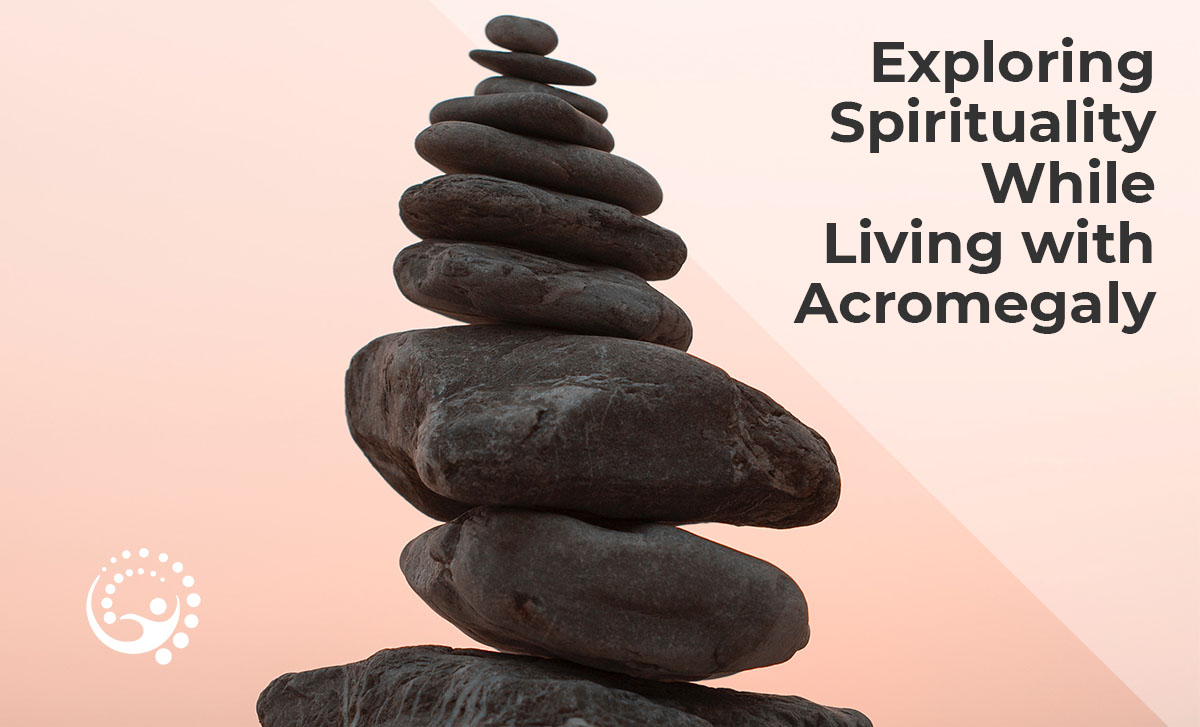A rare disease such as acromegaly affects the body physically; however, the changes many acromegaly patients experience can also significantly influence the mind and spirit. These adjustments can make it difficult to fully embrace life and can create feelings of vulnerability. Accepting the new normal of living with a rare disease can be scary and uncomfortable.
For these reasons, taking a holistic healing approach to your well-being can be incredibly beneficial. Holistic healing refers to a method of healing that focuses on your mind, body, and spirit, all of which are part of the human experience.
Now, the idea of the human spirit may call up many questions in your mind, and that’s understandable. The words spirit and spirituality can be triggering for some people. So before going any further, let’s explore what the term spirituality means and how a spiritual practice can help improve your overall wellbeing, especially when living with a rare disease.
What does spirituality even mean?
When you hear the word spirituality, the concepts of church, meditation, and prayer may come to mind. But this post takes a broader view of spirituality because there are as many ways to define it as there are to practice it.
Surprisingly, there is no widely agreed-upon definition of spirituality. The Oxford English Dictionary says it is “the quality of being concerned with the human spirit or soul as opposed to material or physical things.” Meanwhile, Merriam-Webster frames it as “something that in ecclesiastical law belongs to the church or to a cleric as such.”
When trying to explain something so complex and nuanced, it can be helpful to look at a word’s origins. The word spirit comes from the Old French word espirit meaning “animating or vital principle in man and animals.” Espirit, in turn, comes from the Latin word spiritus, which is related to the word spirare (to breathe).
These related ideas and definitions might conjure up the idea of “animating breath,” and because breath is vital to human life, so too is spirituality. At its core, spirituality is about generating an awareness of the universe and our to something bigger than ourselves. But as a person with acromegaly, you may find connection itself a big challenge. You may feel like withdrawing from your old life or friends and family to hide your symptoms or avoid uncomfortable questions. However, shrinking your life can make you feel lonely and decrease your overall wellbeing, or how satisfied you are with your life—an important overall health metric according to the CDC. The practice of cultivating spirituality can nourish your body, mind, and soul, re-establish that missing sense of connection, and enhance your wellbeing. This is especially important for people dealing with a rare or chronic disease, who are more prone to anxiety and depression.
Spirituality for wellbeing in acromegaly patients
While spirituality has historically been closely associated with religion, more and more people are adopting spirituality into their lives even outside of religious practice. Healthcare researchers are increasingly incorporating or considering spiritual practices when measuring overall wellbeing.1 They’ve also been investigating the efficacy of prayer and meditation in pain management, surgical recovery time, and control of chronic conditions. A preliminary study of advanced cancer patients found that “unaddressed spiritual concerns of patients are associated with decreased psychological and overall quality of life within advanced illness.”2
Outside of healthcare, public schools are replacing detention with meditation and yoga to help young students deal with their stress and anxiety more effectively, and the initial results are promising.3 Research has shown that incorporating a spiritual practice into one’s life can support not only mental and emotional wellness but also, physical health. Spiritual practices can also help people develop coping mechanisms for dealing with a rare or chronic disease.
If you considering ways to nurture your spirit or soul we’ve provided a downloadable resource to help you work through what spirituality means to you. If you’re thinking, “that all sounds great, but how do I find or practice my spirituality?” Don’t worry. In our next post, we’ll explore different activities you may want to try to help you find the expression of spirituality that feels right to you.
Exercises
Was this information helpful to you? If so, please share with others and subscribe to receive the latest content.
HELPFUL TOOLS AND RESOURCES
Chronic Illness, Spirituality, and Healing: Diverse Disciplinary, Religious, and Cultural Perspectives. Edited by Michael J. Stoltzfus, Rebecca Green, and Darla Schumm.
REFERENCES
- Balboni, Michael and Tracy. (2019). “Do Spirituality and Medicine Go Together?”, Center for Bioethics, Harvard Medical School.
- William D. Winkelman, Katharine Lauderdale, Michael J. Balboni, Andrea C. Phelps, John R. Peteet, Susan D. Block, Lisa A. Kachnic, Tyler J. VanderWeele, and Tracy A. Balboni. Journal of Palliative Medicine. Sep 2011. pp.1022-1028. http://doi.org/10.1089/jpm.2010.0536.
- Koenig, H., King, D. & Carson, V (eds.). (2012). Handbook of religion and health. Second edition. New York: Oxford University Press.




